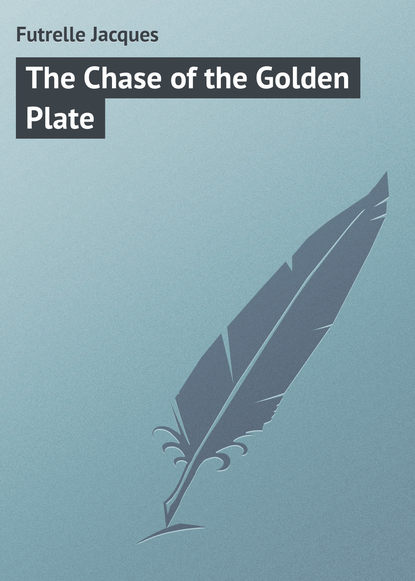По всем вопросам обращайтесь на: info@litportal.ru
(©) 2003-2024.
✖
The Chase of the Golden Plate
Автор
Год написания книги
2017
Настройки чтения
Размер шрифта
Высота строк
Поля
Wearily the Girl repeated it all and at its end Willie giggled. It was the most exasperating incident of a long series of exasperating incidents, and the Girl's grip on the bag tightened a little. Willie never knew how nearly he came to being hammered to death with fourteen pounds of solid gold.
"Well?" inquired the Girl at last.
"Dunno," said Willie. "Jimmy's got the stomach-ache," he added irrelevantly.
"Can't you think of a hotel or boarding-house near by?" the Girl insisted.
"Dunno," replied Willie. "I'm going to the drug store for a pair o' gorrick."
The Girl bit her lip, and that act probably saved Willie from the dire consequences of his unconscious levity, for after a moment the Girl laughed aloud.
"Where is the drug store?" she asked.
"'Round the corner. I'm going."
"I'll go along, too, if you don't mind," the Girl said, and she turned and walked beside him. Perhaps the drug clerk would be able to illuminate the situation.
"I swallyed a penny oncst," Willie confided suddenly.
"Too bad!" commented the Girl.
"Unh unnh," Willie denied emphatically. "'Cause when I cried, Paw gimme a quarter." He was silent a moment, then: "If I'd 'a' swallyed that, I reckin he'd gimme a dollar. Gee!"
This is the optimism that makes the world go round. The philosophy took possession of the Girl and cheered her. When she entered the drug store she walked with a lighter step and there was a trace of a smile about her pretty mouth. A clerk, the only attendant, came forward.
"I want a pair o' gorrick," Willie announced.
The Girl smiled, and the clerk, paying no attention to the boy, went toward her.
"Better attend to him first," she suggested. "It seems urgent."
The clerk turned to Willie.
"Paregoric?" he inquired. "How much?"
"About a quart, I reckin," replied the boy. "Is that enough?"
"Quite enough," commented the clerk. He disappeared behind the prescription screen and returned after a moment with a small phial. The boy took it, handed over a coin, and went out, whistling. The Girl looked after him with a little longing in her eyes.
"Now, madam?" inquired the clerk suavely.
"I only want some information," she replied. "I was out on my bicycle" – she gulped a little – "when it broke down, and I'll have to remain here in town over night, I'm afraid. Can you direct me to a quiet hotel or boarding-house where I might stay?"
"Certainly," replied the clerk briskly. "The Stratford, just a block up this street. Explain the circumstances, and it will be all right, I'm sure."
The Girl smiled at him again and cheerfully went her way. That small boy had been a leaven to her drooping spirits. She found the Stratford without difficulty and told the usual bicycle lie, with a natural growth of detail and a burning sense of shame. She registered as Elizabeth Carlton and was shown to a modest little room.
Her first act was to hide the gold plate in the closet; her second was to take it out and hide it under the bed. Then she sat down on a couch to think. For an hour or more she considered the situation in all its hideous details, planning her desolate future – women like to plan desolate futures – then her eye chanced to fall upon an afternoon paper, which, with glaring headlines, announced the theft of the Randolph gold plate. She read it. It told, with startling detail, things that had and had not happened in connection therewith.
This comprehended in all its horror, she promptly arose and hid the bag between the mattress and the springs. Soon after she extinguished the light and retired with little shivers running up and down all over her. She snuggled her head down under the cover. She didn't sleep much – she was still thinking – but when she arose next morning her mind was made up.
First she placed the eleven gold plates in a heavy card-board box, then she bound it securely with brown paper and twine and addressed it: "Stuyvesant Randolph, Seven Oaks, via Merton." She had sent express packages before and knew how to proceed, therefore when the necessity of writing a name in the upper left-hand corner appeared – the sender – she wrote in a bold, desperate hand: "John Smith, Watertown."
When this was all done to her satisfaction, she tucked the package under one arm, tried to look as if it weren't heavy, and sauntered downstairs with outward self-possession and inward apprehension. She faced the clerk cordially, while a singularly distracting smile curled her lips.
"My bill, please?" she asked.
"Two dollars, madam," he responded gallantly.
"I don't happen to have any money with me," she explained charmingly. "Of course, I had expected to go back on my wheel, but, since it is broken, perhaps you would be willing to take this until I return to the city and can mail a check?"
She drew a diamond ring from an aristocratic finger and offered it to the clerk. He blushed furiously, and she reproved him for it with a cold stare.
"It's quite irregular," he explained, "but, of course, in the circumstances, it will be all right. It is not necessary for us to keep the ring at all, if you will give us your city address."
"I prefer that you keep it," she insisted firmly, "for, besides, I shall have to ask you to let me have fare back to the city – a couple of dollars? Of course it will be all right?"
It was half an hour before the clerk fully awoke. He had given the Girl two real dollars and held her ring clasped firmly in one hand. She was gone. She might just as well have taken the hotel along with her so far as any objection from that clerk would have been concerned.
Once out of the hotel the Girl hurried on.
"Thank goodness, that's over," she exclaimed.
For several blocks she walked on. Finally her eye was attracted by a "To Let" sign on a small house – it was No. 410 State Street. She walked in through a gate cut in the solid wall of stone and strolled up to the house. Here she wandered about for a time, incidentally tearing off the "To Let" sign. Then she came down the path toward the street again. Just inside the stone fence she left her express package, after scribbling the name of the street on it with a pencil. A dollar bill lay on top. She hurried out and along a block or more to a small grocery.
"Will you please 'phone to the express company and have them send a wagon to No. 410 State Street for a package?" she asked sweetly of a heavy-voiced grocer.
"Certainly, ma'am," he responded with alacrity.
She paused until he had done as she requested, then dropped into a restaurant for a cup of coffee. She lingered there for a long time, and then went out to spend a greater part of the day wandering up and down State Street. At last an express wagon drove up, the driver went in and returned after a little while with the package.
"And, thank goodness, that's off my hands!" sighed the Girl. "Now I'm going home."
Late that evening, Saturday, Miss Dollie Meredith returned to the home of the Greytons and was clasped to the motherly bosom of Mrs. Greyton, where she wept unreservedly.
CHAPTER V
It was late Sunday afternoon. Hutchinson Hatch did not run lightly up the steps of the Greyton home and toss his cigar away as he rang the bell. He did go up the steps, but it was reluctantly, dragging one foot after the other, this being an indication rather of his mental condition than of physical weariness. He did not throw away his cigar as he rang the bell because he wasn't smoking – but he did ring the bell. The maid whom he had seen on his previous visit opened the door.
"Is Mrs. Greyton in?" he asked with a nod of recognition.
"No, sir."
"Mr. Greyton?"
"No, sir."
"Did Mr. Meredith arrive from Baltimore?"







